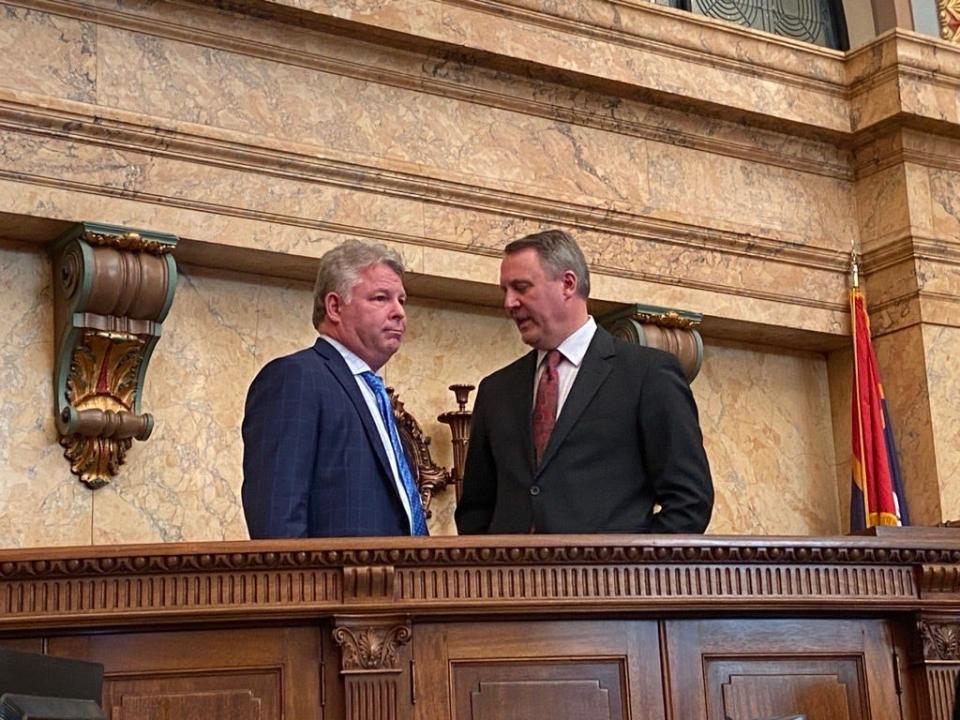MS lawmakers revive bills to fund K-12 education, reform state retirement system
With only nine days left in the legislative session, Mississippi Senate and House lawmakers voted Friday to move forward revived legislation dealing with K-12 education funding, and a bill to reform contribution rates within the state retirement system.
On Thursday, the Senate introduced a suspension resolution that allowed the chamber to consider legislation that had previously been killed by legislative deadlines. The also passed that resolution Friday morning, allowing members of each chamber to work together on previously divisive legislation.
Earlier this year, the House and Senate both killed and revived legislation to rewrite the Mississippi Adequate Education Program with a new funding formula for K-12 education. The Senate also reintroduced efforts to change how the Public Employment Retirement System of Mississippi board makes changes to employer contribution rates into the state retirement system.
Here is what lawmakers did Friday, and what they will likely continue working on through the next few days as the session comes to a close.
House passes third attempt to K-12 education rewrite
House members took a third swipe at passing a new funding model for K-12 education by passing House Bill 4130, dubbed the Mississippi Student Funding Formula, or MSFF.

House Education Chairman Rob Roberson, R-Starkville, told the Clarion Ledger that he and his colleagues had been hammering out a final agreement on how to fund education with Senate leadership for the last two week.
"Hopefully it's the third time's the charm," Roberson said. "I think that that every time we've gone back and revisited, it's gotten a little better, it's gotten a little tighter in terms of what we're trying to accomplish. I certainly wouldn't want to throw shade on anything with the Senate, they brought out some good points, and honestly, in the long run, it makes the bill better."
Previously, the House and Senate had passed competing versions of education funding, with the Senate funding $2.94 billion through MAEP and the House passing the INSPIRE Act, which funded $3.001 billion, added weights to school district funding for specific needs and replaced MAEP's objective funding formula with a committee of education professionals to recommend funding changes in the future.
However, neither side could agree to fund the other's proposal, and House lawmakers were even prepared to hold off funding schools until the Senate agreed to negotiate the House proposal.
Read more about education struggle MS lawmakers still can't agree how to fund K-12 education. House reintroduces its own plan
The new bill includes an objective formula that is based around a base student cost of $6,695, which is $45 more per student than the INSPIRE Act. The SBC is factored from student enrollment and average teacher salaries.
However, the bill does account for funding shortfalls in districts that have declining populations. To address that concern and give school districts an opportunity to grow, for the first three years of the new program, no district will receive less funding than it did in FY 2024, which ends June 30.
The bill now heads over to the Senate, where it is likely to receive a warm welcome from both Senate leadership that helped draft HB 4130 and others.
"In the past several years, we have seen our schools and students achieve so much," Lt. Gov. Delbert Hosemann said after the bill passed through the House. "The Legislature has significantly raised teacher pay, addressed teacher workforce shortages, and increased funding for early education. The Senate’s past work on school funding and the compromise proposal we will hopefully pass this year is the next logical step."
Senate passes PERS legislation
Before the House dealt with K-12 education funding, the Senate passed Senate Bill 3231, which made changes to an employer contribution rate within PERS that is set to begin in July.
After more than an hour of debate, Senate lawmakers voted to approve freezing a 2% employer contribution rate increase, taking it from 17.7% to 19.7%.
Instead, the rate will increase by 0.5% every year for four years beginning in July. The bill would also require the PERS board to make contribution rate recommendations to the legislature accompanied by two financial reports backing up why the increase might be necessary. The legislature would then vote on any rate increases.
Before the vote, Sen. David Parker, R-Olive Branch, who also presented the bill, mentioned that shortfalls in funding that the rate increase would have addressed could be solved by a $100 million cash infusion from the legislature within the coming days.
There were previously two other attempts to change the contribution increase on public employers and also to replace elected board members with state appointees. Those bills both died by legislative deadlines.
What comes next?
Lawmakers have until Saturday night to file revenue bill conference reports detailing key funding measures and until Monday for general bills. Key pieces of legislation still to be decided include the education formula, changes to the state retirement system and Medicaid expansion.
There are nine days left in the 2024 session.
This article originally appeared on Mississippi Clarion Ledger: MS Senate, House vote on separate bills to fund education, revise PERS

